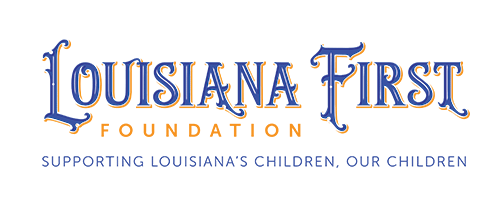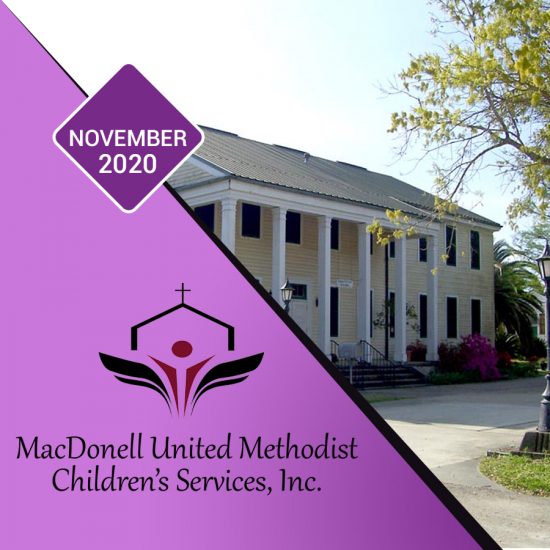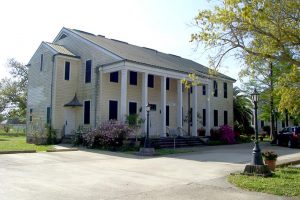
MacDonell United Methodist Children’s Services
For the last 100 years, MacDonell United Methodist Children’s Services has supported children and families in South Louisiana. Our organization has always provided services that fit a need in the community. In the early 1900s, MacDonell served as a school for girls and later a native American school. Our MacDonell campus also served as a boarding school, which transitioned into an orphanage and now serves as a group home for children in the Louisiana foster care system.
Until recently, MacDonell was only providing residential care for children up to the age of 18. Our board, staff, and community members often asked what happens to our residents when they turned 18 years old. Several residents have “aged out” since I have been at MacDonell and some return to the families that previously could not provide for them. While others try to “make it on their own,” I know of at least several former residents living in homeless shelters who would visit our campus, and we would provide them food from time to time.
In 2015, the Louisiana Legislature began working to establish a task force to study outcomes for youth aging out of the foster care system. To continue to help our children, MacDonell started preparing for the possibility of providing services for youth aging out of the foster care system. Our big dream was to provide transitional housing for teens aging out of the foster care system. These young men and women needed additional help to continue on the right path. MacDonell got to work applying for grants to renovate Keener Hall, a former dormitory that is not in use. It was a long three-year process to apply and receive a grant, obtain an architect and a contractor, complete the renovations, obtain the appropriate licensing and a contract with DCFS, and finally open the doors.
Previously, those in foster care were required to move out on their own at age 18. However, on June 6, Governor John Bel Edwards signed legislation extending that to 21 for all youths in foster care at 18. To stay in the home, residents must be 17-20 and either be in school or have a job.
We are trying to create an environment that allows young men and women to experience independent living while also providing a cushion parents would typically give for their children. Our plan is for the home to function as a college dormitory. The building will provide shelter to 10 young adults ages 17-21. Living quarters are two separate spaces. The women’s quarters are downstairs, with three distinct rooms and a communal bathroom. The second floor is all men’s quarters, with seven rooms and one communal bathroom. Each room comes with a bed, desk, microwave, and small refrigerator provided for the residents and their food to prepare in a communal kitchen.
When a resident needs groceries, the staff will go shopping with them and assist with budgeting. The staff will also help pick out the ingredients and assist them with food preparation. We do all this to guide the residents into becoming more self-sufficient and ease their transition into independent living.
Historical Context
- In 2013, funding for the Young Adult Program was completely cut.
- In 2015, a resolution was passed during the Louisiana Legislative session to establish a task force to study outcomes for youth aging out of the foster care system.
2018 PROGRAM
Reached age 18 while in foster care on or after June 1, 2018; and not yet reached age 21; enrolled in high school or an equivalency program.
ELIGIBILITY FOR EXTENDED FOSTER CARE
Eligibility ends at 21 or graduation, whichever occurs first.
- In 2018, a resolution was passed during the Louisiana Legislative session to establish a task force to study the feasibility of extending the age of foster care to 21.
- Louisiana was awarded $3 million over three years to expand effective services for transition-age foster youth.
2019 EXPANDED PROGRAM
Reach age 18 while in foster care, and not yet reached age 21, and meet at least one of the following criteria: Enrolled in a post-secondary vocational or educational program; enrolled in a program or activity designed to promote or remove barriers to employment; employed at least 80 hours
per month; OR have a medical condition that renders the young adult incapable of engaging in any of these activities.
Following benefits for youth:
- Gives youth more time to mature and learn from their mistakes.
- Gives youth more support during the transition to adulthood.
- Prevents foster youth from becoming homeless.
- Keeps young adults connected to caretakers who know them.
- Gives youth a better chance of completing high school or HiSet diplomas/certificates.
- Gives caretakers more opportunities to find adequate living arrangements for young adults in transition.




